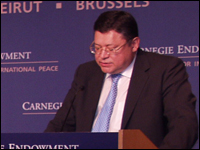Registration
You will receive an email confirming your registration.
IMGXYZ944IMGZYXKazakhstan’s vast energy resources, rapidly growing economy, and important geographical position make the country a key player both in global energy markets and regional power relations. The Carnegie Endowment hosted H.E. Marat Tazhin, the Minister of Foreign Affairs of the Republic of Kazakhstan, for a discussion of Kazakhastan’s position in an increasingly globalizing world.
Despite U.S.-Russia tensions over the conflict in the Caucasus, Tazhin underscored that Kazakhstan has developed its own considered position. Kazakhstan recognizes the humanitarian catastrophe that occurred in South Ossetia and in the neighboring regions of Georgia, and has offered assistance to victims on all sides of this conflict. Secondly, Kazakhstan has criticized Georgia for initiating hostilities on August 7, and believes that this was a mistake in judgment on the part of the Georgian leadership. Most importantly, Kazakhstan offers its strong support to the plan brokered by French President Nicolas Sarkozy, which was endorsed by Russian President Dmitri Medvedev and Georgian President Mikhail Saakashvili. This plan offers the legal framework to address the situation and Kazakhstan urges everyone to be guided by its positions. Finally, as to the question of Kazakhstan’s possible recognition of the independence of south Ossetia and Abkhazia, Astana does not see this as the immediate issue and is not ready to make a decision without a proper study of what is a very complicated issue.
Tazhin made clear that Kazakhstan gives priority to its own economic development. Economic development interests also play a substantial role in shaping its foreign policy objectives.
Kazakhstan’s Role in the World
Tazhin explained that Kazakhstan’s foreign policy stance is defined by its geographical situation. A nation located between major powers, Kazakhstan pursues a balanced policy. The nation sees itself as a bridge between the East and West and understands that its location ensures that it has an important stake in geopolitical matters. Tazhin asserted that regional cooperation between the five Central Asian countries is crucial and needed.
Bilateral Relations
Iran’s close proximity to Kazakhstan ensures that Iran’s nuclear ambitions remain a vital issue for the nation. Kazakhstan points to its own rejection of nuclear weapons as an example of the path on which Iran should proceed. Tazhin stressed that a military solution to Iran’s nuclear ambitions would be catastrophic for the region and the world.
Although Kazakhstan has sent humanitarian aid to Afghanistan, Tazhin said that Kazakhstan’s priority should focus on investing in Afghani industries. However, he also pointed out that doing so has not been easy given the current decision-making process within Afghanistan.
Kazakhstan is committed to bilateral cooperation with the United States. Tazhin identified several key areas where this cooperation may continue to strengthen, including trade, energy, and nonproliferation.
Shanghai Cooperation Organization (SCO)
Tazhin stressed that the SCO’s goal is not to serve as a counter block to NATO. Instead, he hopes that in three to five years it will serve as a mechanism for increased economic cooperation.
